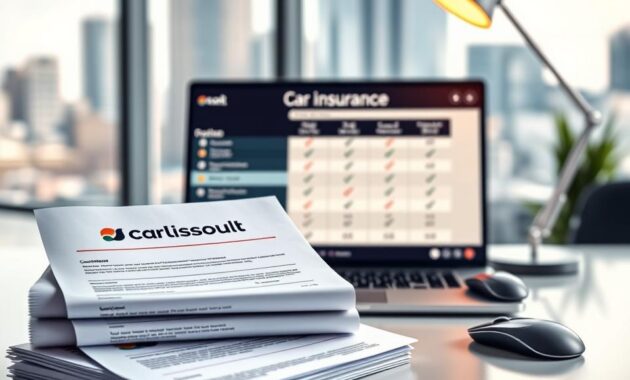Table of Contents
Finding the right car insurance can be tough, but it’s not impossible. With many options out there, it’s key to compare car insurance quotes. This helps you get the coverage you need without breaking the bank.
It’s important to know about the best car insurance companies and what they offer. You should understand what affects your rates and how to reduce them. By looking into different providers, you can choose the best fit for you.
Key Takeaways
- Compare car insurance quotes to find the best rates.
- Understand the factors that affect your car insurance rates.
- Research different insurance companies to find the best coverage.
- Lower your rates by optimizing your policy.
- Consider your specific needs when choosing an insurance provider.
Understanding Car Insurance Requirements in Your Area
Car insurance rules change by state. Knowing what’s needed is key to following the law. Each state has its own minimum coverage rules for drivers. Understanding these rules helps you pick the right car insurance.
State Minimum Coverage Requirements
Most states require liability insurance. This covers damages to others or property in an accident. The amount needed varies by state. For example, some states ask for at least $25,000 in bodily injury liability coverage per person.
Some states also need personal injury protection (PIP) or uninsured/underinsured motorist coverage. PIP helps with medical costs for you and your passengers. Uninsured/underinsured motorist coverage protects you if hit by someone without enough insurance.
Optional Coverage Types to Consider
While state minimums are a base, you might want more coverage. Consider these:
- Collision coverage: Covers your vehicle’s damage in accidents, no matter who’s at fault.
- Comprehensive coverage: Handles damage from non-accident events like theft or natural disasters.
- Roadside assistance: Helps if your car breaks down or you’re stuck.
These extra coverages can give you more peace of mind and financial security.
How Requirements Affect Your Insurance Costs
Your state’s car insurance rules can greatly affect your costs. Higher minimums mean higher premiums. PIP or uninsured/underinsured motorist coverage can also increase your costs.
To save money, compare quotes from different insurers. Consider bundling policies, raising your deductible, or using discounts to lower your costs.
How to Research Car Insurance Near Me
Looking for car insurance locally is as important as knowing what you need. It involves several steps to find the right insurance for you.
Using Online Insurance Comparison Tools
Online comparison tools are a great way to start. They let you see different quotes together. This makes it easy to compare prices and coverage.
Top Websites for Insurance Quotes
Top Websites for Insurance Quotes
- Progressive
- Geico
- Esurance
- Allstate
- State Farm
These sites are popular for getting quotes. They offer good rates and many coverage choices.
Checking Local Insurance Agency Reviews
Don’t forget to look at local agency reviews too. They give you a peek into how happy customers are and the service quality.
Yelp or Google reviews can show you what’s good and what’s not about local insurance companies.
Asking for Recommendations from Friends and Family
Asking people you know is also a smart move. They share their real-life experiences with different insurance companies.
| Research Method | Benefits | Examples |
|---|---|---|
| Online Comparison Tools | Easy comparison of quotes and coverage | Progressive, Geico, Esurance |
| Local Insurance Agency Reviews | Insights into customer service and satisfaction | Yelp, Google Reviews |
| Recommendations from Friends and Family | Personal experiences and feedback | Word of mouth |
Gathering Information for Accurate Quotes
Before you start comparing car insurance quotes, make sure you have all the required details. Having the right information ready can make the process smoother. It ensures you get accurate quotes.
Vehicle Information You’ll Need
To get an accurate car insurance quote, you’ll need to provide specific details about your vehicle. This includes:
- The make, model, and year of your vehicle
- The Vehicle Identification Number (VIN)
- Information about any safety features or modifications
Where to Find Your VIN and Vehicle Details
You can find the VIN on the driver’s side dashboard near the windshield or on the driver’s side doorjamb. It’s also listed on your vehicle’s registration and insurance documents. Having this information handy will help insurance providers give you a more accurate quote.
Driver History Details to Prepare
In addition to vehicle information, you’ll need to provide details about your driving history. This includes:
- Your driver’s license number and state of issuance
- Any past accidents or traffic violations
- Information about other drivers who will be covered under the policy
Being transparent about your driving history can help you get a more accurate quote. It can also avoid any issues with your policy.
Coverage Preferences to Determine
Before receiving a quote, you’ll also need to decide on your coverage preferences. Consider the following:
- The level of coverage you need (liability, collision, and more)
- Your deductible amount
- Any additional coverage options you might want (like roadside assistance)
Understanding your coverage needs will help you compare quotes more effectively. It ensures you’re getting the right protection for your vehicle.
Comparing Car Insurance Quotes Effectively
When you compare car insurance quotes, don’t just look at the price. It’s important to see if you’re getting the right coverage. Cost is key, but it’s not everything. You need to check other important parts of the insurance policy too.

Looking Beyond the Premium Price
The price you pay is just the beginning. Think about what you get for that money. Look at the coverage, deductibles, and any extra services the company offers.
Key factors to consider:
- Coverage limits and what they include
- Deductible amounts and how they affect your premiums
- Additional benefits such as roadside assistance or rental car coverage
Evaluating Coverage Limits and Deductibles
Coverage limits show the most an insurance company will pay for a claim. Higher limits mean more protection but cost more. Deductibles are what you pay first before insurance kicks in. Lower deductibles cost more but mean less upfront cost for claims.
Balancing coverage limits and deductibles is key to protect yourself without overpaying.
Assessing Company Reputation and Customer Service
The insurance company’s reputation and customer service matter a lot. You want a company that’s financially strong and pays claims well. Good customer service is also important, so you can get help when needed.
Researching an insurer’s reputation involves:
- Checking financial ratings from independent rating agencies
- Reading customer reviews and ratings
- Evaluating their claims handling process
By looking at these points, you can choose the best car insurance quote.
Strategies to Lower Your Car Insurance Rates
To cut down on car insurance costs, it’s key to know about discounts and policy tweaks. By using the right tactics, you can greatly reduce your insurance rates.
Discounts You Should Ask About
Many insurance companies have discounts that can lower your premiums. Always ask about these when you’re buying or renewing your policy.
Safe Driver and Good Student Discounts
Insurers give discounts to safe drivers and students who do well in school. Keeping a clean driving record and good grades can save you a lot of money.
Vehicle Safety Feature Discounts
Cars with safety features like anti-lock brakes and airbags might get extra discounts. Making sure your car has these features can lower your insurance costs.
How Bundling Policies Can Save Money
Getting multiple policies from the same company can save a lot. Combining your car insurance with home or life insurance can simplify things and save you money.
The Impact of Deductible Choices on Premiums
Choosing the right deductible is important for your insurance costs. A higher deductible means lower premiums but more out-of-pocket costs for claims. Finding the right balance is key.
By understanding and using these strategies, you can lower your car insurance rates and save money in the long run.
Conclusion
Now you know how to find the best car insurance. Use online tools for car insurance comparison. Also, check local agency reviews and ask for recommendations.
Don’t forget to ask about car insurance discounts. You might get discounts for bundling policies or having a good driving record. Choosing your deductibles wisely can also lower your rates.
Follow these steps to get the right car insurance at a good price. Start your car insurance near me search today. Drive away with confidence.
FAQ
What are the minimum car insurance requirements in my state?
How do I compare car insurance quotes from different companies?
Q: How can I lower my car insurance rates?
Q: What is the difference between liability, collision, and comprehensive coverage?
Q: How do I evaluate the reputation and customer service of an insurance company?
Q: Can I get a car insurance quote without having all the necessary information?
Q: How often should I review and update my car insurance policy?




